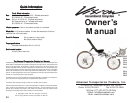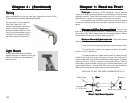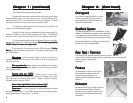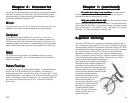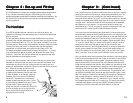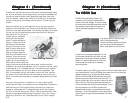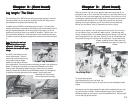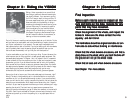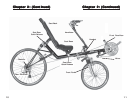
7
The VISION SeatThe VISION Seat
The VISION SeatThe VISION Seat
The VISION Seat
The 2002 Vision seat feature a new anti-slip
mechanism on the nose quick release skewer to
prevent accident seat releases. To remove the seat,
you must loosen the seat QR skewer lever, and then
turn the skewer loose an additional several turns
until the side plate disengages from the seat
droppout.
If you have to attach or remove the seat
fabric, follow these directions.
There are two webbing pockets on the seat
fabric top that go over the seat side rail
backs - attach these first, then follow the
illustrations for the seat panel attachment. For the
first few weeks, the seat fabric will stretch a bit and
appear loose. Simply tighten the fabric as needed -
the fabric will stabilize after about 100 miles or so.
Check the seat before each ride for abrasions,
tears and tightness.
To install the seat on your VISION, simply insert the front of the seat frame into the
main frame attachment. Turn the QR Skewer down several turns until the side plate
engages the dropout slot, nd tighten the skewer securely.
Note: on the R40 and R60 series bikes, there are two front
seat mount positions; use the forward one if you are 5' 7" or
shorter, the rear position if you are taller or want to sit further
back on the bike. Slide the rear seat frame attachment fork
into the rear skewer and tighten the rear seat skewer. One of
the unique features of your VISION recumbent is its
adjustable seat back angle - accomplished at the rear seat
attachment. For the first adjustment, set the rear seat back
to the middle of its range, and close the skewer with at least
20 lbs force.
Chapter 2: (Continued)Chapter 2: (Continued)
Chapter 2: (Continued)Chapter 2: (Continued)
Chapter 2: (Continued)
14
Sit awhile, rock back and forth and from side to side. Notice how the seat cradles
you, and how comfortably close to the ground you are. Grasp the handlebars and
rock the front wheel from side to side. Squeeze the brake levers. Yodel a few
times. Do whatever it takes to relax. Many first time riders try to sit forward on
the seat, not being used to the relaxed, laid back position. Sit back! Enjoy the
comfort!
Now pick a dominant leg. For most people this is your right leg, but go with
whatever is most comfortable for you. Pick your leg up and swing the crank arm
around so you can easily reach the pedal. If you are using toe straps, flip the pedal
clip over your foot, but keep the strap nice and loose to start with. Swing the
crank around until your foot is in a
“cocked” position; somewhere
close to the top of the pedal
stroke. This spot is different for
everyone, the key is to find the
spot where you feel best about
putting a lot of power into the
pedal. It helps to hold the bike
from rolling with either brake.
When you’re ready, release the
brake, and push forward firmly on
the pedal. As you start moving,
lift your other foot up and keep
peddling. At first you probably will
wobble a little, but don’t panic and
tense up! Just relax and concentrate on making small corrections with the
handlebars. The most common beginners' error is to overcontrol the bike, ending
up steering a set of “S” curves down the lane. If you relax and let your hands sit
lightly on the handlebars, you will find it easier to avoid this syndrome. Lean
back! You are probably trying to lean forward, to mimic that "other" type bike
you've been riding. Another common first time mistake is to stare at your feet —
after all, you’ve never seen them before! Look ahead, see the scenery you’ve been
missing.
Once you’re riding smoothly in a straight line, it’s time to practice looking
around. Now don’t laugh, I’m not being funny nor condescending. Compared to a
traditional bike you will find yourself looking at the world from a whole new
perspective, a comfortable one. The biggest problem you will face is keeping
your mind on the road. Since you are riding in a relaxing reclined position it’s all
too easy to forget about everything except the scenery in front of you. Looking
behind you is not difficult, but it does take practice. As you ride in a straight
Foot Starting Position
Chapter 3: (Continued)Chapter 3: (Continued)
Chapter 3: (Continued)Chapter 3: (Continued)
Chapter 3: (Continued)



